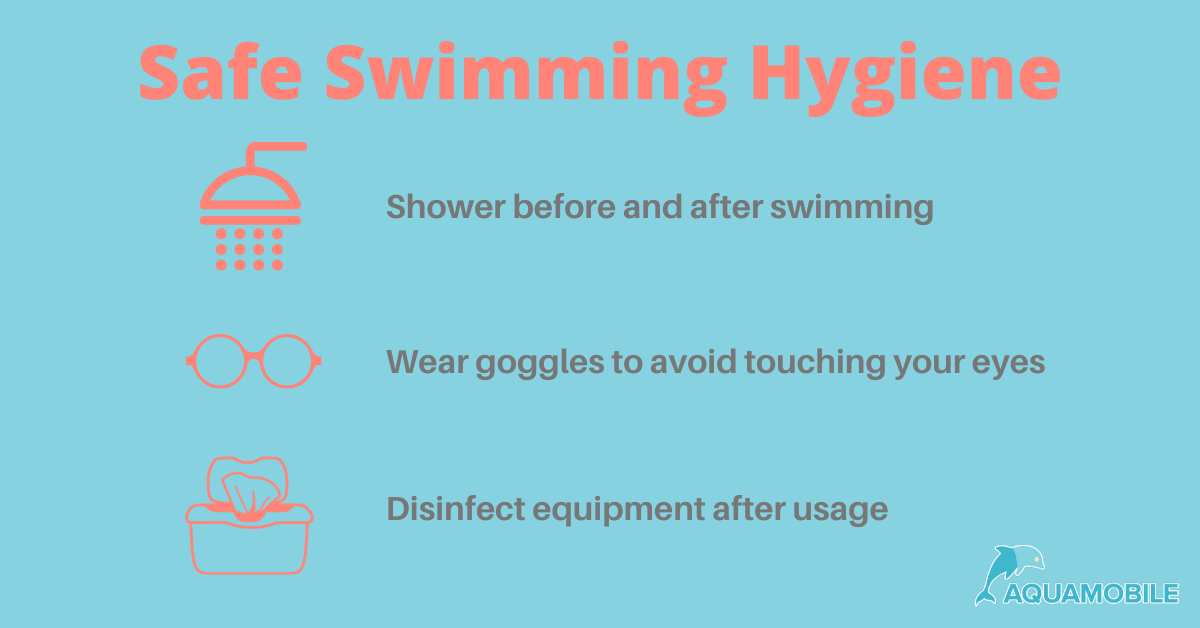
Pools everywhere are closing or are closed due to coronavirus concerns. We’ve compiled research from multiple Health and Local Authorities that clarifies why this is happening, and whether or not swimming is still safe.
For further background on COVID-19, see our article that compiles research on what and how this pandemic started and spread.
Can you get COVID-19 from the water?
Coronavirus is a respiratory virus that is primarily spread via airborne droplets over a short distance, which can quickly settle on nearby surfaces. You may get the virus when you then touch those infected surfaces and then touch your eyes, mouth, and/or nose.
The Centre for Disease Control (CDC) has stated:
“There is no evidence that COVID-19 can be spread to humans through the use of pools and hot tubs. Proper operation, maintenance, and disinfection (e.g., with chlorine and bromine) of pools and hot tubs should remove or inactivate the virus that causes COVID-19.”
In fact, Covid-19 has not been detected in even regular Municipal tap drinking water, let alone a properly chlorinated and disinfected pool. As long as proper filtration and disinfection is used, your pool water and drinking water should be safe.
Why are pools closed then?
Public Health Officials and Property Managers have begun closing public and/or community/condo pools and recommending individuals reduce contact with each other through social distancing. Since Coronavirus is a respiratory disease that is most easily spread through close human contact, most Authorities are recommending limiting public group sizes to smaller than 10 or 50 people. These closures are an attempt to slow the spread of COVID-19 by preventing areas people can gather in close contact in large groups, not because pools are inherently unsafe.
How long does COVID-19 last on surfaces?
A recent study by National Institute of Health scientists has found that the virus can remain alive for up to three days on different surfaces. The researchers have found that the virus can last for up to:
- 3 hours in the air
- 24 hours on cardboard
- 48 hours on stainless steel
- 72 hours on plastic
While the virus can last up to 72 hours, the half life, or the time it takes for half of the virus to die, was found to be approximately 5.6 hours on stainless steel and 6.8 hours on plastic. Since this research found the virus decays faster as time goes on, you would have significantly less risk of getting infected after these few hours.
While your risk is reduced after a few hours, Public Health Officials and Property Managers have closed most pools because these facilities still pose a risk to greater transmission and spread of the disease. Think: door handles, pool ladders, benches, diving boards, locker rooms, etc.
Can I use my home pool?
All authority recommendations have been closing public and community pools to enforce social distancing/stay-at-home restrictions to avoid human contact; not because current health guidelines believe you can contract coronavirus from the water in your pool. Backyard pools are usually fenced-in due to local Municipal rules. These physical barriers limit the access of others to your pool, allowing you to minimize the risk.
So if you have a private pool, you can keep it open at your discretion. Just be cautious of the amount of people that have access to your pool, and ensure that they are doing their part to prevent the spread of COVID-19.
Otherwise, using your pool during a time of social distancing or self-isolation at home can be a great way to get some exercise and entertain the family.
Practice safe swimming hygiene
To be as safe as possible and reduce the risk of spreading transmission when going for a swim, we recommend these safety tips:
- Shower before and after entering the pool
- Bring sanitation wipes and disinfect any equipment used/shared before and after swimming with others
- Wear goggles, or if you have, a full-face snorkel mask to prevent touching your eyes/face
In general, to prevent the spread of COVID-19, you should:
- Ensure all participants wash their hands for a minimum of 20 seconds with soap and water or use hand sanitizer before starting a session
- Avoid touching your mouth, eyes, and nose
- Try to maintain 4-6 feet distance from other people
Should I drain my pool?
Since there is no evidence COVID-19 can be spread through pools or chlorinated/filtered water, there is no need to drain your pool, and you should follow your normal pool water change routine. As long as you take care of your pool on a daily basis and adhere to proper maintenance and appropriate pH levels, you won’t have to change your pool water. For year-round pools, the usual frequency to change your pool water is every 5-7 years.
Are swimming lessons safe?
Guidance will change based on the current recommendations of your Public Health Professionals, however at the moment (April 2020), swimming lessons and pools are safe, and most lesson providers and pools are on pause simply to support social distancing and flattening the curve.
Even when social distancing is relaxed, the world will be on high alert for any signs of spikes in cases of COVID-19 until a vaccine can be mass produced. Until then, it’s best to remain cautious and avoid large group settings to reduce the risk you or your loved ones get infected.
Swimming is a life-saving skill and everyone should learn to stay safe and confident around the water when pools start to open. As restrictions relax, private swimming lessons in your at-home or apartment pool can be a great way to ensure you avoid large groups and crowded pools.

